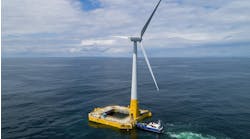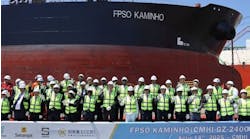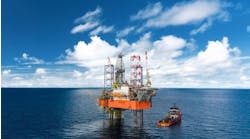Jeremy Beckman
Editor, Europe
Despite the general uncertainty over investments in offshore projects, the service sector in the Netherlands remains in good shape.
"There is concern that the intake of new orders for the long term is slowing down. Small to mid-size operators have had problems financing projects, and some of the big boys have been delaying awards of new contracts, extending negotiations in an attempt to drive down costs.
"Others, though, like Shell and BP, have announced investment programs for the year ahead, and will stick to them. In the end, the industry will have to act to produce new reserves. So in general, I’m quite positive about the outlook. I predict that a year from now, we’ll be in the same position we were in a year back."
So far there have been two bankruptcies among IRO members, but this is a normal figure, according to de Boer. "We started the year with 349 members, now we are at 365 and still growing. All the big Dutch contractors are members already. The new recruits are mainly SMEs: some are joining for the networking opportunities, but others have been active in industries outside the oil and gas sector which currently are not doing so well. They see ours as providing better opportunities."
Like other national trade associations, IRO organizes pavilions for its members at major oil and gas events. The Dutch group regularly provides the largest overseas contingent at OTC, this year occupying the maximum space allowable of 935 sq m (10,064 sq ft). The IRO pavilion at Offshore Europe in Aberdeen next month will be somewhat smaller, at 365 sq m (3,929 sq ft). As in 2007, 24 IRO members will have their own stands, with seven represented on the combined IRO booth. One of the participants will be Vryhof Anchors, returning to Aberdeen after a gap of several years.
Interest in the North Sea remains strong. In the Dutch offshore sector, there have been no new entrants or operators so far this year, unlike previous years. But the government is considering new incentives in response to the credit crisis, some as a result of lobbying by IRO and the Dutch operators’ association, NOGEPA.
Last December, for instance, the regulation concerning Depreciation at Will was amended temporarily, allowing companies to claim relief on new capital assets during 2009-10. Around the same time, the Ministry of Economic Affairs proposed an amendment to the Dutch Mining Act, allowing an extra 25% of capital costs to be deducted from profits for exploration and production of certain marginal fields.
This proposal still is under discussion, says de Boer.
IRO has organized pavilions this year also at Gastech in UAE, Oil and Gas Asia in Kuala Lumpur, Offshore Brazil in Macae, and KIOGE in Kazakhstan, with Adipec, Neftegaz, Tripoli Oil and Gas, OTC, ONS, and Rio Oil & Gas all on the line-up for 2010.
"We’re also looking at doing something in Malaysia, as the Kuala Lumpur exhibition in June was quite successful from our point of view," says de Boer. During the event IRO agreed to form a strategic relationship with the Malaysian Oil and Gas Services Council, cooperating in areas including technology innovation and business development.
Further IRO trading missions have been arranged over the past 12 months, including visits to Angola, Libya, Iran, Saudi Arabia and Qatar. Another mission was scheduled to Mexico, but this has been postponed until November due to the recent health scare. The new program will include a seminar, hosted by Crown Prince Willem Alexander of the Netherlands, presenting Dutch service group capabilities.
"Among our members, the dredging specialist Boskalis has been successful in the Mexican sector," de Boer points out. "Van Dam in Ridderkerk has supplied fireproof doors for offshore installations, and Frames Energy Systems in Zoeterwoude has provided process equipment. Aluminum fabrication specialist Bayards sees potential in the Mexican Gulf for its helidecks."
In late-September, another delegation will head to Norway for presentations in Stavanger, where the focus will be on opportunities in Arctic operations. IRO also is participating in joint export promotion programs with maritime associations in the Netherlands to regions such as the Middle East, Russia, and Brazil.
The skills vacuum is an ongoing concern. "My generation in their late 50s and early 60s who started the industry up in the 1960s and 1970s are retiring," says de Boer, "so the shortage of skilled staff in the Netherlands is still growing. Despite uncertainty over the industry’s future, most IRO member companies are still looking for technically skilled people at all levels."
Last year Paul Meester joined the IRO team in Zoetermeer to spearhead the Personnel Group’s initiatives on employment and education, under a program supported by NOGEPA. IRO is working with technical colleges and institutes in the Netherlands to improve vocational training. One development in this regard is a new, four-year HBO course for the maritime industry that includes offshore and shipbuilding modules. Two technical colleges in Leeuwarden and Den Bosch now run four-year courses for the offshore and oil and gas sectors – each has 30-40 students lined up for the first year, according to de Boer.
Among other initiatives, IRO’s Gas Group is in consultations with the Dutch government over plans to establish the Netherlands as a hub for gas distribution in Western Europe. This agenda includes three new LNG terminals, one of which is currently under construction in Rotterdam.
Related to this is a proposal to develop new underground storage facilities in depleted fields onshore and offshore, to accommodate gas and captured CO2. Delft-based technical institute TNO is involved in both programs.
ON THE COVER: The Stanislav Yudin installing the platform for Cirrus Energy’s new M7-A gas development in the Dutch North Sea. Picture: Seaway Heavy Lifting.




